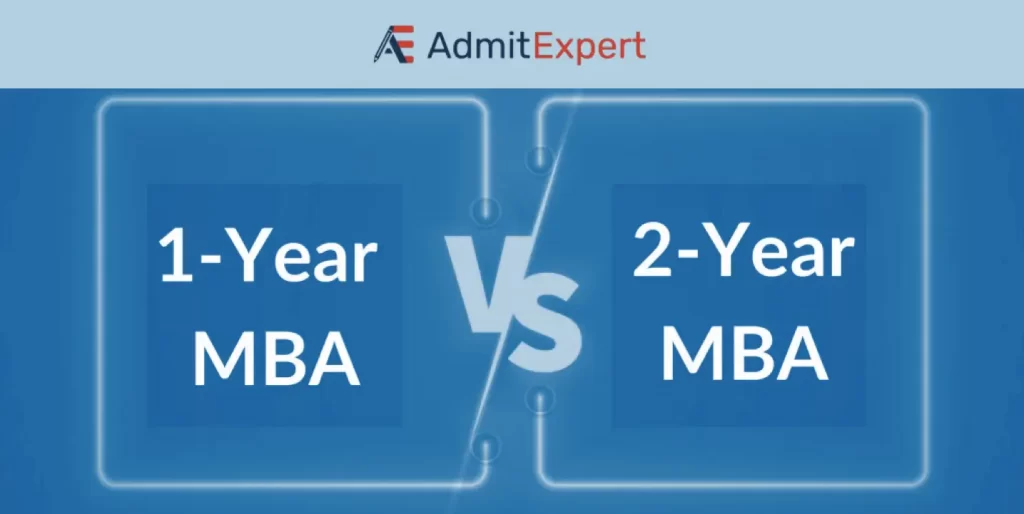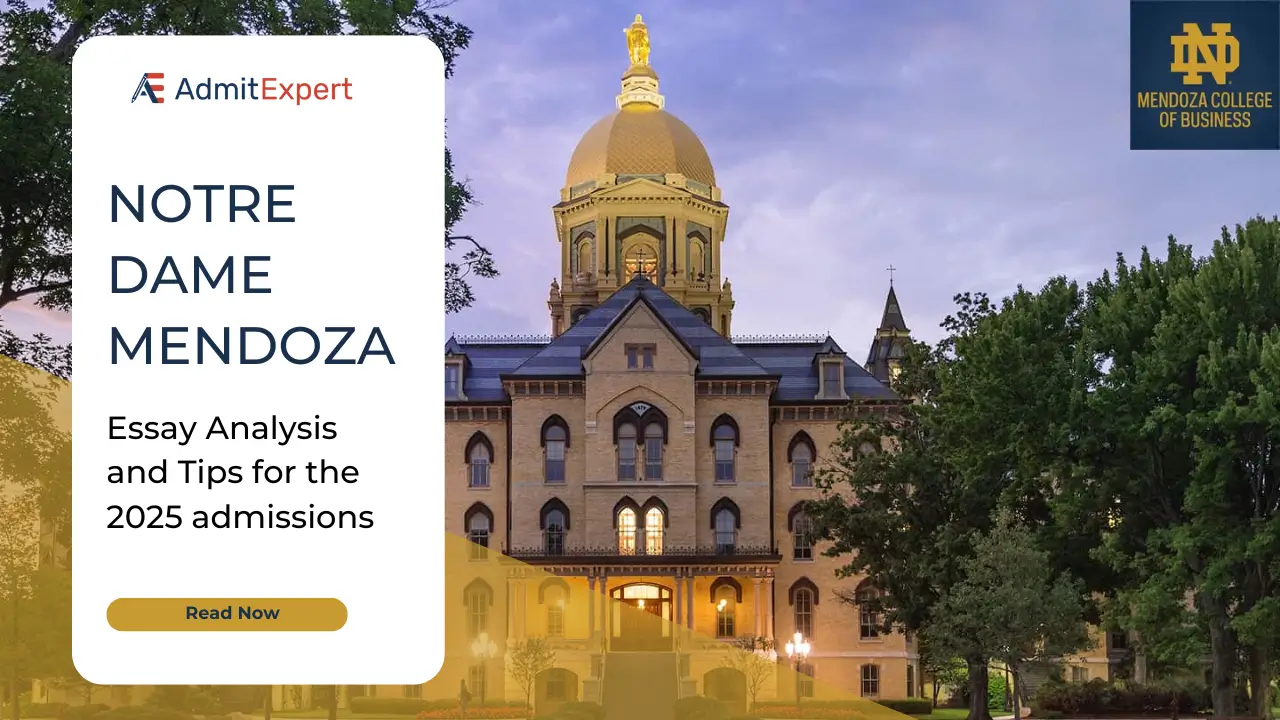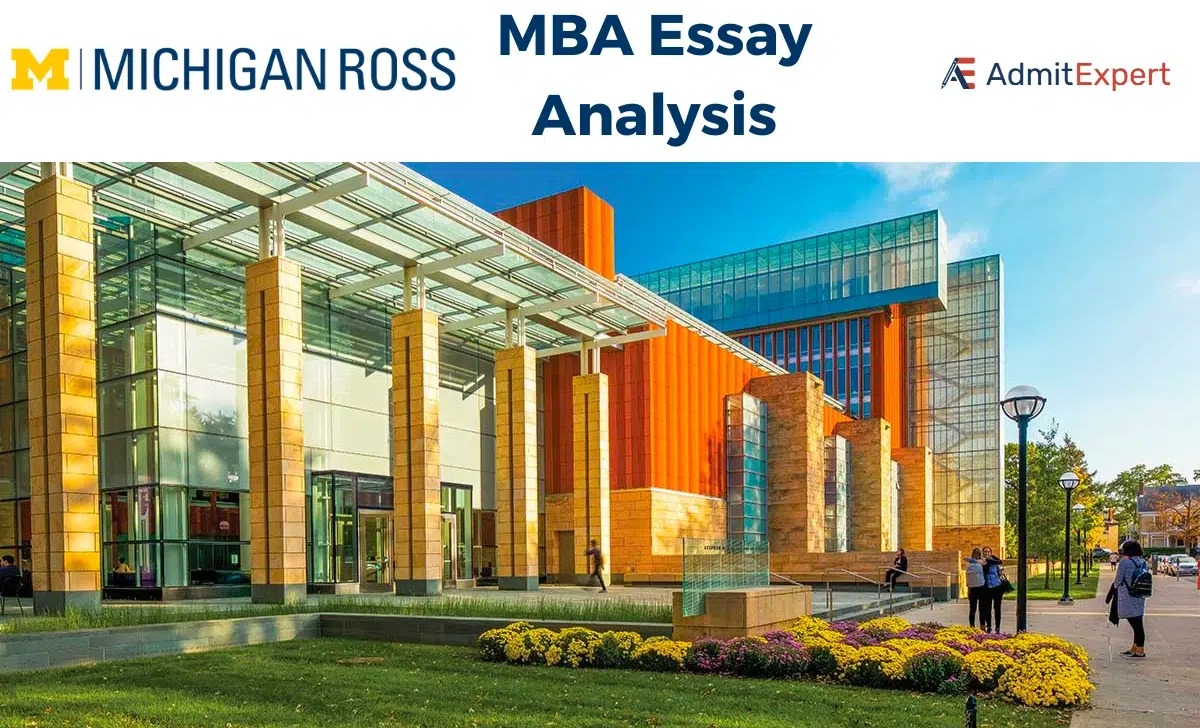If you are keen on maximizing your MBA ROI in terms of time and money, you are bound to ponder this question: With the ability to speed up the learning process and a low tuition cost, why not pursue a one-year MBA program instead of a two-year MBA program? Although there is a cost and time advantage, you are letting go of the additional time to pursue internships and networking opportunities. So, how do you choose which program is better for you – one year MBA or two year MBA?

This article highlights the difference between a one-year and a two-year MBA program. By the end of this article, you will be able to evaluate which program fits the best for you in just 4 steps!
One-year vs. Two-year MBA program
You can choose various MBA program formats and lengths as a prospective MBA candidate. There are many types of MBAs, including one-year, two-year, part-time, executive, online, and specialized programs, with a set of pros and cons.
This article will highlight the difference between a one-year and two-year full-time MBA program.
According to the Prospective student survey, the full-time MBA still reigns supreme as the preferred program type. Within a full-time MBA program, around 22% of students prefer two-year MBAs, whereas 21% prefer a one-year MBA program. The difference is negligible.
So, how do these students choose a one-year over a two-year program? There has to be a concise thought process behind it.
Before diving into the steps, let us understand 6 parameters to differentiate one-year vs. two-year MBA program:
- Academic Background
- Work Experience
- Career Goals
- Cost & ROI
- Networking
- Curriculum
| Parameters | One-Year MBA Program | Two-year MBA program |
|---|---|---|
| Academic Background | Diverse | Distinctive |
| Work experience | 5+ years | 2+ years |
| Career Goals | Advancement within a defined field | Looking for a career shift |
| Cost & ROI | Low Cost and High ROI | High Cost and Low ROI |
| Networking | Low | High |
| Curriculum | More focus on electives | Core + electives |
Academic Background
Do you have a diverse academic background or have a strong hold over one particular field? You must look into your educational background to evaluate whether a one-year or two-year MBA is the right fit. Generally, candidates from diverse backgrounds get admitted to a two-year MBA program. For instance, the Harvard MBA class 2023 has students from Engineering (27%), Business (21%), Economics (20%), Math (15%), Social Science (13%), and Arts (4%).
A typical class profile of a one-year MBA program includes candidates with a solid quantitative background. For instance, Most students who enroll in the one-year MBA program at Mendoza college of business are from a business background.
Work Experience
The average work experience for a full-time two-year MBA program is 3-5 years. In fact, if you are opting for a deferred MBA program, you can apply with no work experience. Top Business schools like Harvard, Stanford, Wharton, and Chicago Booth offer deferred MBA programs.
The average work experience for a full-time one-year MBA program is 5+ years. In fact, the average work experience at some top business schools is even more than 10 years. For example, at USC Marshall, the average work experience is 12 years.
Career Goals
A one-year MBA program targets students who want to advance within their defined field. Moreover, the program is intensive; all the learning and activities are packed into a 10-12 month time frame. So, before full-time recruitment begins, there are fewer opportunities for you to explore different career paths. Thus, candidates should have focused and clear career goals.
On the other hand, a 2-year MBA program allows you to explore more opportunities in the form of an internship. For example, a two-year MBA with a summer internship may offer a better chance if you want to switch your industry. Also, some companies still prefer recruiting young graduates through their management trainee programs after evaluating candidates in their summer internship programs. You also get time to explore elective courses.
Cost & ROI
The tuition fee for a 1-year MBA program is lower than for a 2-year program. For instance, the total tuition for the accelerated MBA program at Kellogg School of Management is $122,878, whereas, for the traditional 2-year program, it is $161,858.
Moreover, the opportunity cost for a one-year MBA is lower as you only spend 1-year away from the job market. So, if you are an experienced professional, a one-year MBA program might offer you a higher return on investment and a significantly lower opportunity cost.
Networking
A two-year MBA program offers more networking opportunities than a one-year MBA program. During your 1st year, you meet 2nd-year students who will mentor you through your MBA journey. Moreover, you also get to interact with and mentor other first-year students as you advance to the 2nd year of your MBA.
A two-year MBA program also offers internship opportunities. You get extra time networking with organizations of your choice and exploring new industries.
Thus, when it comes to a one-year MBA program, networking may be limited as you interact with students from only your cohort. Also, the networking opportunities outside the campus are limited due to a lack of internships.
Curriculum
A one-year MBA program allows you to bypass core classes and immediately dive into advanced studies customized to your career goals. The curriculum is designed keeping in mind the work experience of the students. As the students have prior work ex., the basic understanding of professional and organizational work environments is higher than a fresher. So, the number of core courses is less than a two-year MBA program. Most one-year MBA programs either offer core classes at an accelerated pace or allow students to place out specific courses.
On the other hand, a 2-year MBA program offers freshers sufficient time to develop through the business world, starting with the required core course, internship opportunities, and then diving into electives.
For instance, the one-year MBA curriculum at Kellogg School of Management requires you to complete 3-5 core courses whereas the two-year MBA curriculum consists of nine core courses.
Which is better for you – 1 Year or 2 Year MBA?
Now that you know the key differences between one-year and two-year MBA programs, how do you choose? Here are 4 steps that can help you decide:
- Step 1: Evaluate your Profile
- Step 2: Define Career goals
- Step 3: Evaluate Trade-offs
- Step 4: Compare yearly cost of attendance
Step 1: Evaluate your Profile
The first step is to evaluate your profile. A one-year MBA program is for candidates with more than 5 years of work experience. At Johnson Cornell, the average one-year MBA student has 6 years of work experience, while an average two-year MBA student has 5 years of work experience. Thus, candidates with more extended work experience and a proven quantitative aptitude tend to prefer this type of program because they can handle the intensity of the coursework.
Apart from work experience, other personal and professional factors are also at play. For example, if you have 10+ years of experience, you might prefer a one-year MBA program, as it will allow you to get back to the job market sooner. Moreover, if your company sponsors your studies, they might be more inclined to do so if you finish your degree sooner.
Step 2: Define your Career goals
Defining your career goals is crucial when pursuing any type of MBA program. Once you have defined your goals, you must evaluate whether a one-year or a two-year MBA program is better.
For example, a two-year MBA program will offer you more time to explore new opportunities if you come from a finance background and want to switch to marketing. On the other hand, if you have worked in the marketing field for 5+ years and looking to upgrade your knowledge in the same area, a one-year MBA program fits you the best. Moreover, a one-year program can be challenging if you are an international student looking for work opportunities post-MBA in your chosen MBA destination. You will have less time to acclimate to a new country, focus on academics, and job hunt simultaneously.
Thus, it is essential to define and evaluate your career goals.
Step 3: Evaluate the trade-offs
There are three significant trade-offs between pursuing a one-year and two-year programs – Time, Money, and Opportunities.
Due to its low cost and short length, a one-year MBA program can be enticing. However, you miss out on internship opportunities. On the other hand, a 2-year MBA program offers you an internship and more time to explore options through networking, but it is costly and time-consuming. Thus, it would help if you decided what you are willing to sacrifice and how it will be beneficial in achieving your career goals.
Step 4: Compare yearly cost of attendance
After evaluating the trade-offs, you will be in a better position to choose between One-year vs. Two-year MBA. As the last step take a look at the yearly cost of attendance to zero in on the program that maximizes your ROI. Here are the tuition fees of some of the top one-year and two-year US MBA programs:
| Top One-Year MBA Program | GMAT Score | Average Work Experience | Yearly Tuition |
|---|---|---|---|
| Katz Graduate School of Business | 625 | 5 | $ 79,500 |
| Kellogg School of Management | 727 | 5 | $ 1,08,016 |
| Marshall School of Business | 630 | 12 | $ 1,21,728 |
| Goizueta Business School | 625 | 5.9 | $ 1,50,300 |
| Johnson Graduate School of Management | 720 | 6 | $ 1,18,758 |
| Mendoza College of Business | 635 | 5 | $ 85,400 |
| Hough Graduate School of Business | 687 | 5 | $ 60,261 |
| Cox School of Business | 683 | 5.4 | $ 61,614 |
| Graziadio School of Business and Management | 625 (Middle 80% range) | NA | $ 27,315 (per term) |
| F.W. Olin Graduate School of Business | 640 | 6 | $ 89,550 |
| Top Two-Year MBA Program | GMAT Score | Average Work Experience | Yearly Tuition |
|---|---|---|---|
| Chicago Booth School of Business | 732 | 5 | $ 77,841 |
| The Wharton School | 733 | 5 | $ 84,874 |
| Kellogg School of Management | 727 (Mean) | 5 | $ 1,05,380 |
| Stanford Graduate School of Business | 738 | 4.8 | $ 76,950 |
| Harvard Business School | 730 (Median) | 5 | $ 73,400 |
| MIT Sloan School of Management | 730 (median) | 5 | $ 80,400 |
| Yale School of Management | 730 | 4.4 | $ 79,000 |
| Columbia Business School | 729 | 5 | $ 77,376 |
| Berkeley Haas School of Business | 726 | 5.5 | $ 71,817 |
| Michigan Ross School of Business | 722 | 5 | $ 72,114 |
We hope you can now evaluate whether to pursue a one-year or a two-year MBA program. Apply the 4 steps mentioned above and evaluate your MBA program fit.
One-Year vs. Two-Year MBA Program – FAQs
Yes. A one-year MBA program is cheaper, shorter, and has a better ROI upon getting a job. However, a one-year MBA is worth it if you are an experienced professional with clear career goals.
Yes. Pursuing an MBA at 30 or 40 will provide an immense learning experience. It is advised not to make age a barrier to becoming the best version of yourself. Most Business schools usually do not fix an age limit for MBA. Your intention of doing an MBA at 30 and how much it makes sense for your career are more important than your age.
There are no specific guidelines on minimum work experience. However, the average work experience at top business schools is between 4 and 5 years. So, having a work experience of 4 years gives you a fighting chance of getting into your dream business school.
Yes. Business schools like Kellogg and Cornell Johnson offer STEM-designated tracks.
Yes. Business schools like Columbia Business School, Stanford GSB, NYU Stern, UC Berkeley Haas, and CMU Tepper offer STEM designation for the entire full-time two-year MBA program.




